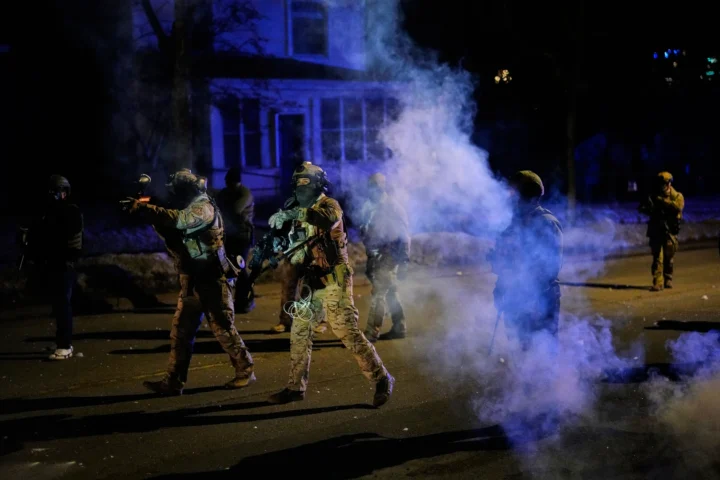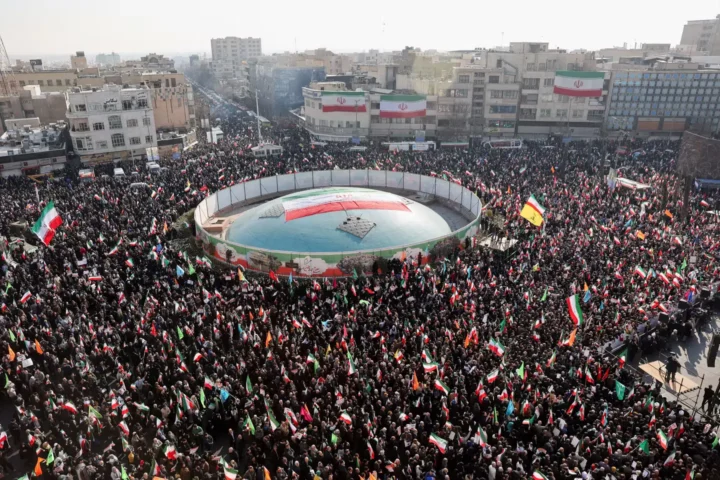As Poland hurtles toward one of the most contentious presidential elections in its post-Communist history, the frontrunner from the right-wing nationalist camp is finding strength not despite the swirling scandals around him — but perhaps because of them.
Karol Nawrocki, the Law and Justice (PiS) party’s favored candidate, has seen his campaign weather a storm of increasingly salacious allegations. Claims of links to organized crime, involvement in prostitution rings, and shadowy real estate dealings have dominated headlines in recent weeks. Yet far from derailing his candidacy, the uproar appears to be galvanizing his support base in a deeply polarized nation.
With just days to go before Sunday’s election, the race remains too close to call. Nawrocki trails liberal Warsaw Mayor Rafał Trzaskowski by a single percentage point, according to POLITICO’s aggregated polling. The intensity of the campaign has reached fever pitch, with personal attacks flying between the camps of Trzaskowski and Prime Minister Donald Tusk on one side, and the PiS-backed Nawrocki on the other.
From Brawls to the Ballot
Nawrocki’s unorthodox image has become central to his appeal. Far from denying all the claims, he’s leaned into certain parts of his past. The former head of the Institute of National Remembrance has boasted about his involvement in football hooligan fights, touting his background as a boxer. He claims such experiences reflect strength and authenticity, not lawlessness.
Other accusations are more serious — and less welcomed by his campaign. One of the most explosive charges came via investigative portal Onet, which reported Nawrocki allegedly arranged for sex workers while working in hotel security in Gdańsk. A government MP has publicly vouched for the story’s accuracy, and further scrutiny followed over a property transaction with an elderly man in the same city.
Nawrocki has fiercely denied the allegations, dismissing them as politically motivated smear campaigns. “Media slander did not destroy President Trump. It will not destroy Karol Nawrocki, either,” he posted defiantly on social media. His campaign has promised legal action against the outlets publishing the claims.
Tusk on the Offensive
Prime Minister Donald Tusk has seized on the revelations to paint Nawrocki as unfit for office and has taken aim at PiS leader Jarosław Kaczyński for promoting him.
“You knew about everything, Jarosław,” Tusk declared in a fiery online post. “About the connections with the gangsters, about ‘arranging for girls’ … about the apartment fraud and other matters still hidden. The entire responsibility for this catastrophe falls on you!”
In turn, PiS has tried to flip the narrative by casting doubt on Trzaskowski’s integrity. The party has suggested — without offering hard evidence — that Trzaskowski is dodging drug tests and is implicated in a longstanding waste management corruption scandal in Warsaw’s city hall. Trzaskowski has dismissed the allegations as desperate distractions.
A Nation at a Crossroads
Observers warn that the sensational tone of the campaign reflects deeper fissures in Polish society. The stakes are high: a win for Trzaskowski would empower Tusk’s government to push forward with a pro-European reform agenda. Victory for Nawrocki, however, could thwart those efforts, giving PiS a powerful check on government initiatives.
“Poland is at a dangerous inflection point,” says political scientist Anna Siewierska-Chmaj. “These scandals may have actually solidified Nawrocki’s support among undecided PiS voters. But the campaign is so volatile now that it risks sparking real-world consequences.”
She warns that the political climate is so charged it could spill into violence: “The level of polarization and mutual animosity is starting to translate into real aggression.”
Trumpian Tactics, Polish Version
Nawrocki has not only adopted some of Trump’s rhetoric but also his strategy — casting the media as hostile, positioning himself as a populist outsider, and using every scandal to rally his core supporters. His appearance at a CPAC conference in Poland and a high-profile meeting with Donald Trump earlier in the campaign have cemented the comparison.
Meanwhile, PiS continues to frame Trzaskowski as a puppet of Tusk, whose administration is facing growing dissatisfaction. Recent polling showed a decline in support for the ruling coalition, with over half of Poles rating Tusk’s government negatively.
“In the final stretch of the campaign, Tusk wants to install his puppet in the presidential palace,” said PiS lawmaker Andrzej Śliwka. “He’ll stop at nothing to do it.”
An Election With European Implications
As an EU and NATO member, Poland’s political direction carries weight beyond its borders. With Europe watching, the outcome of Sunday’s vote could redefine the country’s role in Brussels, its relationship with the United States, and its internal democratic trajectory.
For now, both camps are digging in for what promises to be a dramatic showdown. Whether Nawrocki’s scandals prove to be a fatal flaw or a bizarre badge of honor will be revealed at the ballot box — and perhaps reshape Poland’s future in the process.











